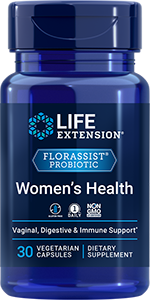
The Best Probiotics for Women
Published: December 2023
The female body has unique needs that men do not—and vice versa. For instance, women's hormones fluctuate over their lifespan, which can then lead to significant changes in gut microbiota, vaginal health and immune system function. Probiotics are a great way to support some of these inevitable changes. The problem is with countless probiotic supplement formulas on the market, figuring out the best option is no easy feat.
Luckily, you've come to the right spot. We'll break down the basics of probiotics, so you know what to look for on a label and which specific probiotic strains best support your health needs.
What are probiotics?
Probiotics are live microorganisms, such as bacteria and yeast, that are beneficial to overall health when consumed through food, beverages and/or supplements. Probiotics can be helpful all throughout the body, but they are primarily known for their actions in the digestive tract, where they influence the gut microbiome and gut health.
Contrary to popular belief, probiotics are not the friendly bacteria that live in your gut. While they do provide gut health benefits, probiotics do not originate inside your stomach and intestines. Instead, probiotics are an external source of live microorganisms that must be consumed or applied to the body to be beneficial. The microbes that live in and on your body are part of what's known as your microbiome.
Probiotics 101: Strains and CFUs
When it comes to probiotics, there are a few terms you might want to get to know:
Probiotic strains—Some health benefits are strain-specific, which is why it's important to know how to identify each probiotic on a product label. This will help you find a probiotic best suited for vaginal health versus one better suited for immune system health. When you're shopping for probiotic products, you'll likely come across the seven core probiotic genera (the plural being genus) used in probiotic supplements, which include Lactobacillus, Bifidobacterium, Saccharomyces, Streptococcus, Enterococcus, Escherichia and Bacillus.
Colony Forming Units
—While a probiotic supplement label will list the total weight (usually as milligrams or mg) of microorganisms contained in the product, the best way to check how much probiotics you're getting is by looking at the number of colony forming units (CFUs). This tells you the number of live microorganisms in the probiotic product. CFUs are usually in the billions, which is how you'll commonly see it written out on a label.It's important to note that a higher CFU count does not necessarily translate to better benefits. In fact, a probiotic product's health benefits depend more on the specific microorganisms (which strain) it contains than on the number of microorganisms (the CFUs) it contains.
The best probiotics for women's health
Between the different forms and different strains, choosing the right probiotics can quickly become confusing. Don't sweat it, though. We've narrowed down the probiotics best suited to support the unique needs of women, whether that means gut health, vaginal health or even managing the changes that come with menopause. There is no one-size-fits-all approach for everyone, so depending on your own personal needs, you may want a probiotic supplement that provides one particular strain or a combination of these strains. Let's dive in!
Immune health
Looking for a little extra support to defend against immune challenges? Lactobacillus helveticus is a science-backed probiotic worth adding to your supplement routine. In a clinical study over 14 weeks, L. helveticus LAFTI® L10 encouraged immune system health. In a separate clinical study, LAFTI® L10 was found to relieve digestive discomfort and promote gastrointestinal health in as little as two weeks.
Vaginal health
When it comes to best supporting the health of your vaginal microbiome, Lactobacillus plantarum is another research-backed option you'll want to add to your regimen. The evidence suggests a specific strain of this probiotic promotes optimal vaginal health while inhibiting colonization of other bacteria. In fact, in a clinical trial, women taking L. plantarum ROSELL® A had a 95% improvement in their healthy vaginal floral levels after 45 days. There's no question why ROSELL® A is a prominent ingredient in probiotics for women's vaginal health.
Menopause
Although menopause and some of its less-than-desirable effects can't be avoided, there are certain probiotics that can help make this transition a little easier, including Lactobacillus acidophilus.
As part of a multi-strain formula, Lactobacillus acidophilus has been studied to support healthy hormone production in both perimenopausal and postmenopausal women. In turn, this may also favorably influence cardiometabolic health in women. In the double-blind clinical study, the probiotic given to participants had a total CFU count of 2.5 billion, which was divided into three doses per day for five weeks. While Lactobacillus acidophilus wasn't the only species in the studied formula, it is easy to find in food and supplements.
Senior women
Pregnant women and new moms may choose B. breve, but what about probiotics for older women? Look no further than Bifidobacterium longum for gut health. In a 2017 evaluation of current research, "probiotics produced a small but meaningful benefit" in elderly people experiencing occasional constipation, with the type of good bacteria most often tested being Bifidobacterium longum.
Explore Our Best Women's Health Supplements
What are some sources of probiotics?
Natural food sources
—A few years ago, kombucha made a splash in the health drink market, gaining lots of praise for its gut health benefits. While evidence is actually mixed when to comes to kombucha as a good source of probiotics, there are plenty of fermented foods and natural food sources that contain probiotics:- Yogurt
- Sauerkraut
- Kefir
- Kimchi
- Fermented soybeans (tempeh, miso)
- Fermented pickles
- Sourdough bread
- Some soft cheeses (gouda)
Functional foods
—Sometimes, probiotics are added to foods (everything from cereal to chips) to enhance their functionality—they're sometimes even added to natural sources to help amplify their benefits!Dietary supplements
—When probiotics are formulated into dietary supplements, you get a concentrated, standardized dose of the beneficial bacteria. And for those who have trouble digesting dairy, dietary supplements offer a dairy-free option to get the healthy bacteria they need. A probiotic supplement may be in the form of tablets, capsules, chewables, lozenges, powders or liquids.Probiotics vs. Prebiotics vs. Synbiotics
Though the words look and sound alike, prebiotics are not the same as probiotics. The main difference is probiotics are live, beneficial microbes; whereas prebiotics are food for the microbes—generally non-digestible fibers found in plant foods. The purpose of prebiotics is to help promote the growth of this good bacteria by acting as a fuel source for probiotics. Prebiotics also play a role in calcium absorption, immune health and metabolism.
Meanwhile, synbiotics are products that combine probiotics and prebiotics in a synergistic way to provide maximum health benefits. Synbiotics can be found in food sources or as dietary supplements.
Should a woman take probiotics daily?
The best probiotics for women offer health benefits for the whole body. So yes, making sure you consume probiotic-rich foods, plus adequate fiber every day is a good place to start. Unfortunately, probiotics from fermented foods alone may not be enough if you're trying to target specific needs, like vaginal health.
You're going to be best supported by a daily probiotic supplement that contains the right mix of beneficial bacteria. This is why an easy-to-swallow dual-encapsulated option might be best. When seeking out probiotic formulas, look for products that provide multiple probiotic strains and a reasonably high number of CFUs. The most comprehensive supplements are formulated to optimize the digestive system, promote a healthy immune system and support total-body wellness. When one capsule can do so much, you'll want to take it every day!
And the best part about probiotics is there's no right or wrong time of day to take them. And they can even be taken on an empty stomach, making it easier to tailor your supplementing to your specific schedule and needs.
Concerned about the safety of probiotics? As the NIH notes, probiotics have an extensive history of safe use, especially in healthy people. However, it's always a good idea to discuss dietary supplements with your primary care provider. The same goes for making any changes to your daily diet or supplement routine—speak with a qualified healthcare professional first.
When the right strain-specific formulas are used properly, probiotic supplements can be life-changing for a woman's health and vitality.
References
- "Probiotics – Fact Sheet for Consumers." National Institutes of Health, Office of Dietary Supplements. https://ods.od.nih.gov/factsheets/Probiotics-Consumer/
- "Probiotics: What You Need to Know." National Center for Complementary and Integrative Health." August 2019. https://www.nccih.nih.gov/health/probiotics-what-you-need-to-know
Like what you read?
Please subscribe to get email updates on this blog.









